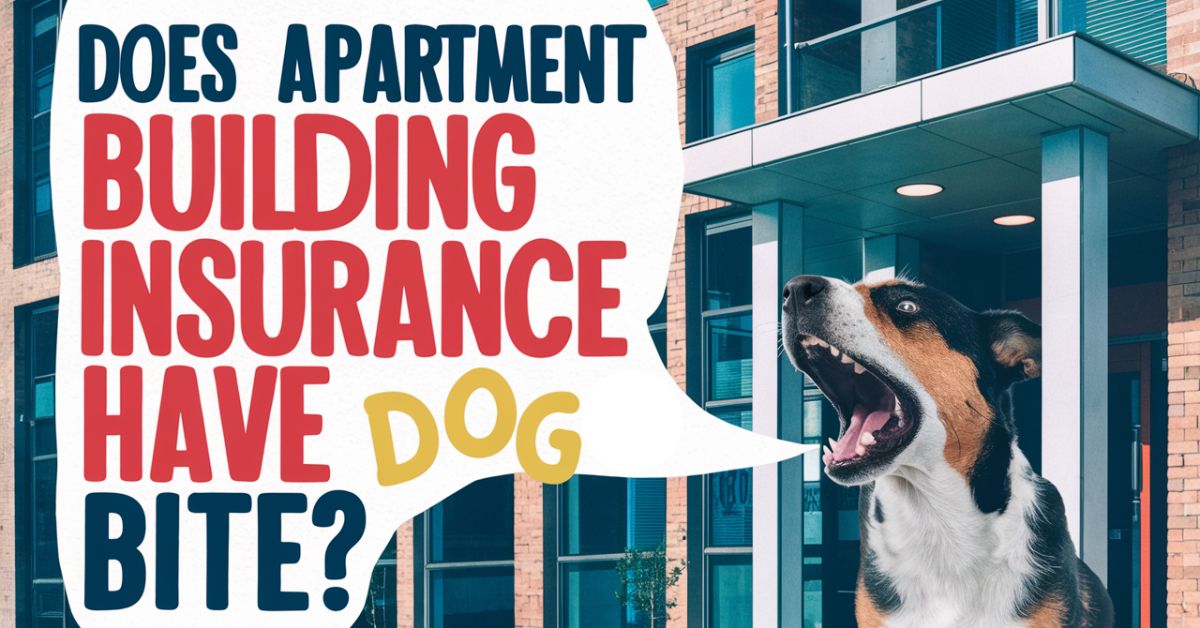Apartment building insurance is a type of coverage that protects property owners. It helps pay for damages and injuries that happen on the property. This can include dog bites in some cases.
Dog bites can be a serious problem in apartment buildings. They can cause injuries and lead to costly lawsuits. This is why it’s important to know if building insurance covers dog bites.
In this article, we’ll look at how apartment building insurance works for dog bites. We’ll also explore what tenants and landlords need to know about this topic. Let’s dive in and learn more about this important issue.
Understanding Apartment Building Insurance
Apartment building insurance is a must-have for property owners. It protects them from financial losses due to accidents or damages. This insurance can cover many things, from fires to slip-and-fall accidents.
Building insurance often includes liability coverage. This means it can help pay for injuries that happen on the property. Dog bites may fall under this coverage, but it depends on the policy.
Some building insurance policies have specific rules about pets. They might cover dog bites, but only for certain breeds. Other policies might not cover dog bites at all. It’s important for landlords to check their policy details.
How Building Insurance Handles Dog Bites?
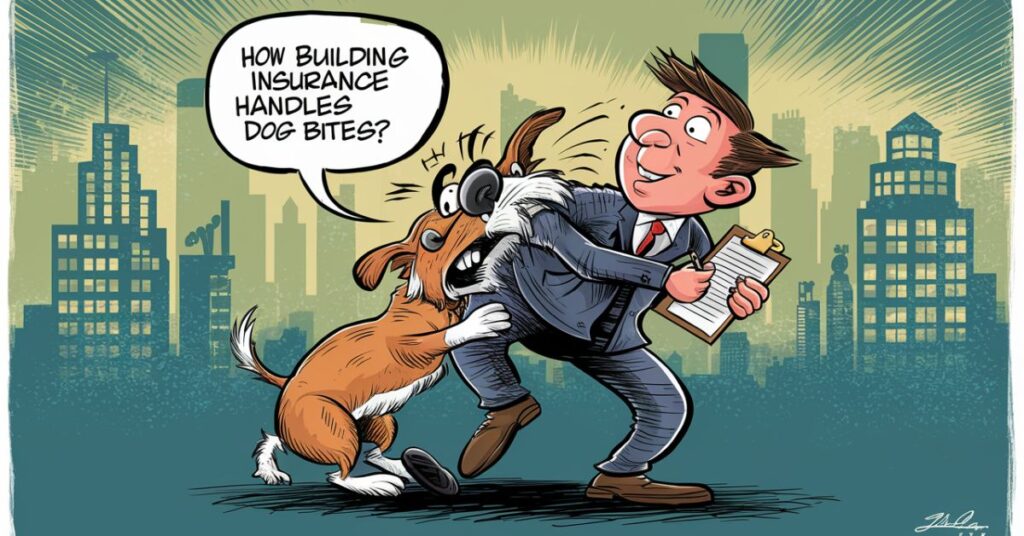
When it comes to dog bites, building insurance can be tricky. Some policies cover dog bites, while others don’t. It often depends on the insurance company and the specific policy.
If building insurance does cover dog bites, it usually works like this: The insurance company pays for the victim’s medical bills. It may also cover legal fees if the victim sues. There’s usually a limit to how much the insurance will pay.
It’s important to note that building insurance might not cover all dog bite cases. For example, if the dog belonged to a tenant, the tenant’s renter’s insurance might need to pay instead. Or, if the landlord knew the dog was dangerous, the insurance might not cover the bite.
Factors That Affect Dog Bite Coverage
Several factors can affect whether building insurance covers dog bites. Some key points to consider:
- The specific terms of the insurance policy
- The breed of the dog involved in the bite
- Where the bite occurred on the property
- The dog’s history of aggression
- The landlord’s knowledge of the dog’s presence
Building Insurance and Dog Bite Liability
Building insurance plays a crucial role in dog bite liability cases. It can provide coverage for injuries that occur on the property. This includes incidents involving dogs owned by tenants. The extent of coverage can vary widely between policies.
Some building insurance policies may exclude dog bites entirely. Others might cover them but with specific limits or restrictions. The breed of the dog often affects coverage decisions. Landlords should carefully review their policies to understand their protection.
1. Policy Limits
Building insurance policies have limits on how much they’ll pay. For dog bites, this limit might be lower than for other types of accidents. Landlords should check their policy limits to make sure they have enough coverage.
2. Breed Restrictions
Some building insurance policies don’t cover certain dog breeds. These are usually breeds that are seen as more aggressive. If a banned breed bites someone, the insurance might not pay. This is why some landlords ban certain dog breeds in their buildings.
3. Location of the Bite
Where the dog bite happened can matter for insurance coverage. If it happened in a common area, like a hallway or lobby, the building insurance might cover it. But if it happened inside an apartment, the tenant’s insurance might need to pay instead.
4. Dog’s History
If a dog has bitten someone before, it might affect insurance coverage. Some policies won’t cover bites from dogs with a history of aggression. This is why it’s important for landlords to know about any problem dogs in their building.
5. Landlord’s Knowledge
If a landlord knew about a dangerous dog and didn’t do anything, it could affect insurance coverage. The insurance company might refuse to pay if they think the landlord was negligent. This is why landlords need to take action if they know about aggressive dogs.
Tenant Responsibilities and Renter’s Insurance
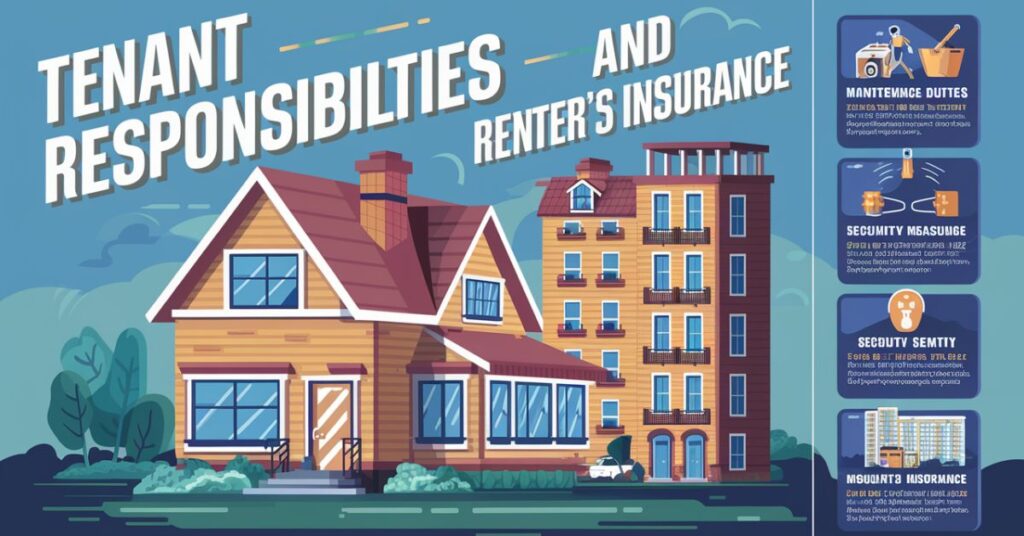
Tenants have responsibilities when it comes to their pets. They should follow all building rules about pets. This includes leash laws and picking up after their dogs. Tenants should also tell their landlord if they have a dog.
Renter’s insurance is important for tenants with dogs. It can help pay for damages if their dog bites someone. Some landlords require tenants with dogs to have renter’s insurance. This helps protect both the tenant and the landlord.
Tenants should also train and socialize their dogs. This can help prevent dog bites from happening. If a dog does bite someone, the tenant should report it to the landlord right away.
Read this article: When Does Gap Insurance Not Pay?
Comparing Building Insurance and Renter’s Insurance
Simple comparison of building insurance and renter’s insurance for dog bites:
| Feature | Building Insurance | Renter’s Insurance |
| Who buys it? | Landlord | Tenant |
| What it covers | Common areas, sometimes inside apartments | Inside apartments, sometimes common areas |
| Typical coverage limit | Higher | Lower |
| Breed restrictions | Often | Less common |
| Cost | More expensive | Less expensive |
Landlord Responsibilities for Dog Bites
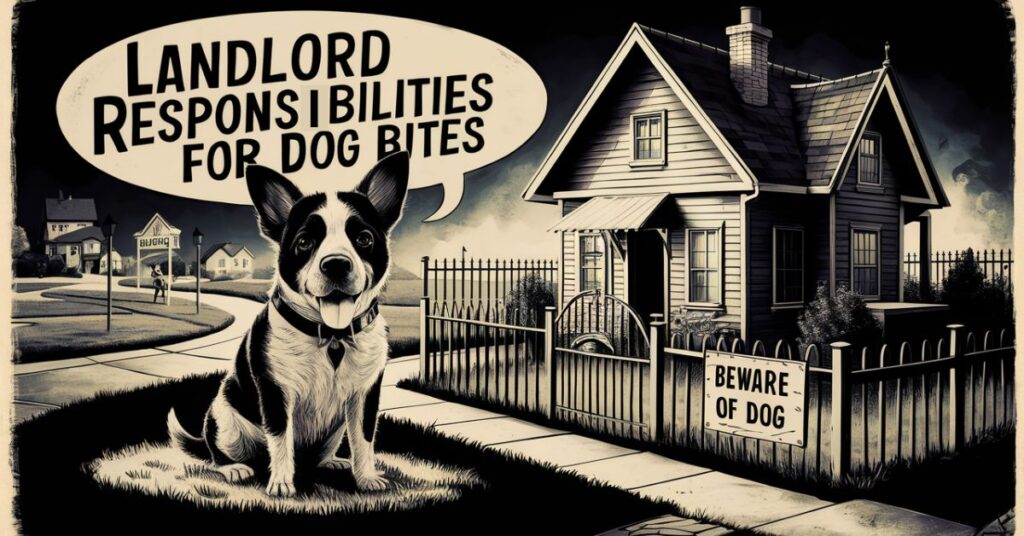
Landlords have several responsibilities when it comes to dog bites. They need to make sure their building is safe for all tenants and visitors. This includes taking steps to prevent dog bites.
One responsibility is creating and enforcing pet policies. These policies should clearly state what types of pets are allowed. They should also outline rules for pet behaviour. Landlords should make sure all tenants know and follow these rules.
Another responsibility is responding to complaints about dangerous dogs. If a tenant reports an aggressive dog, the landlord should take action. This might mean asking the dog’s owner to get training for their pet. In serious cases, it might mean asking the tenant to remove the dog from the property.
Building Insurance and Legal Liability
Building insurance can help protect landlords from legal liability. If someone sues because of a dog bite, the insurance might cover legal fees. It might also pay for any damages awarded in the lawsuit.
Building insurance doesn’t protect landlords in all cases. If a landlord was negligent, they might still be held liable. For example, if they knew about a dangerous dog and did nothing, they could be sued.
It’s important for landlords to understand their legal responsibilities. They should know what their building insurance covers and what it doesn’t. This can help them avoid costly lawsuits and keep their tenants safe.
Steps to Take After a Dog Bite Incident
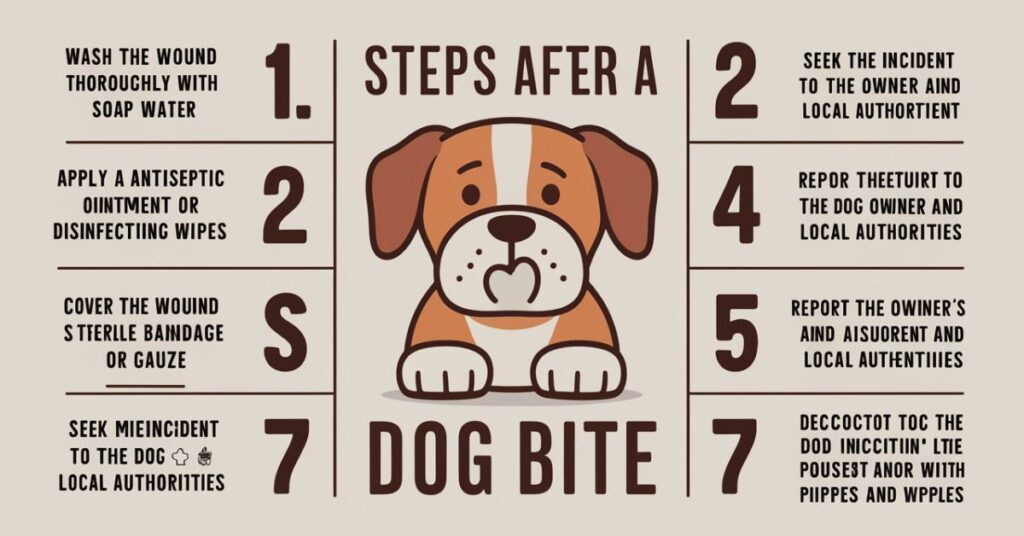
After a dog bite, quick action is important. First, get away from the dog to prevent more bites. Clean the wound with soap and water right away. Then, seek medical care as soon as possible.
Next, report the incident to the property manager. They need to know about the dangerous dog. Also, file a report with local animal control. This creates an official record of the bite.
1. Report the Incident
After a dog bite, the first step is to report it. The victim should tell the landlord or property manager right away. They should also file a report with local animal control. This creates a record of what happened.
2. Seek Medical Attention
The bite victim should get medical care quickly. Even small bites can lead to infections. A doctor can treat the wound and document the injury. This documentation can be important if there’s a lawsuit later.
3. Document Everything
It’s important to gather information about the incident. This includes the date and time of the bite. It also includes the names of any witnesses. Photos of the injury and the scene can be helpful too.
Building Insurance Claims Process
Filing a claim with building insurance can be complex. The basic steps:
- Report the incident to the insurance company right away
- Provide all necessary documentation about the bite
- The insurance company will investigate the claim
- They’ll decide whether to approve or deny the claim
- If approved, they’ll pay out according to the policy terms
Future Considerations for Building Insurance

Building insurance is always changing. New laws and court cases can affect how it works. Landlords need to stay informed about these changes. They should review their policies regularly to make sure they have the right coverage.
Insurance companies are also adapting to new risks. Some are offering special coverage for dog bites. Others are changing their policies to exclude certain breeds. Landlords should talk to their insurance agents about these changes.
In the future, we might see more focus on preventing dog bites. Insurance companies might offer discounts for buildings with strong pet policies. They might also reward landlords who take steps to prevent dog bites.
Final words
Dog bites in apartment buildings are a serious issue. They can cause injuries and lead to costly lawsuits. Building insurance can help protect landlords, but it’s not a perfect solution.
Landlords need to understand their building insurance policies. They should know what’s covered and what’s not. They also need to create and enforce strong pet policies. This can help prevent dog bites and protect everyone in the building.
Tenants have responsibilities too. They should follow all pet rules and get renter’s insurance. By working together, landlords and tenants can create safer living spaces for everyone.
Frequently Asked Questions
Does building insurance always cover dog bites?
No, coverage depends on the specific policy and circumstances of the bite.
Can landlords ban certain dog breeds?
Yes, many landlords ban breeds considered high-risk by insurance companies.
What should a tenant do if their dog bites someone?
They should report it to the landlord and their renter’s insurance company right away.
Can a landlord be sued for a tenant’s dog bite?
Yes, if the landlord was negligent in some way, they could be held liable.
How can landlords reduce dog bite risks?
By creating and enforcing clear pet policies and responding to complaints about dangerous dogs.

David: Seasoned financial expert with 5 years in banking and investments.
Skilled in personal finance, market analysis, and wealth management. Empowers clients to achieve financial goals.

